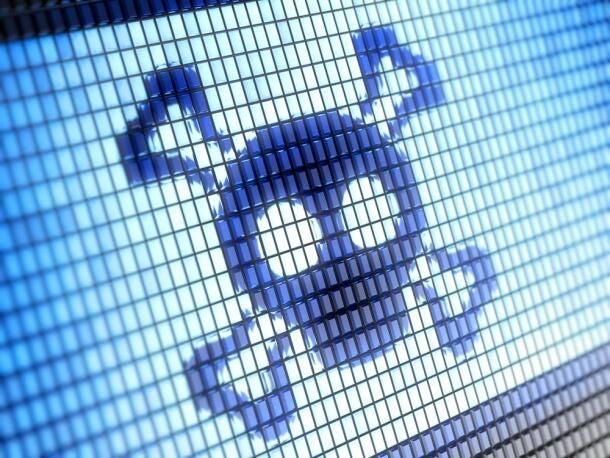In a world where cyberattacks have become increasingly complex, consumer antivirus solutions are not enough to protect large businesses and enterprises. More robust tools and technologies are required to keep sensitive company resources safe and secure.
Fortunately, enterprise antivirus software, endpoint detection and response software and extended detection and response tools are just a few of the innovative security solutions primed to protect large businesses today.
In this article, we take a look at the best enterprise antivirus solutions for you and your organization.
Top enterprise antivirus comparison
As a disclaimer, this list features a mix of enterprise antivirus software and more advanced EDR and XDR solutions. With enterprises, a traditional antivirus may not suffice in protecting your enterprise. Thus, I included a variety of security solutions that will hopefully cover all types of enterprise needs and requirements.
| Starting price | Demo or trial available | Standout features | OS support | |
|---|---|---|---|---|
| SentinelOne Singularity | Contact sales for pricing | Can request demo | Overall value and low impact on machine resources | Windows, macOS, Linux, Windows XP, IoT, cloud workload protection |
| Microsoft Defender for Endpoint | $54.75 per user, per month | Free trial available | Can be bundled with Microsoft 365 apps and services | Windows, macOS, Linux, Android, iOS, and IoT devices |
| CrowdStrike Falcon | $184.99 per device, per year | Free trial available | Strong threat detection and blocking performance | Windows, macOS, Linux, ChromeOS |
| ESET Protect | Contact sales for pricing | Free trial available | Balance of home and enterprise antivirus | Windows, macOS, iOS, Android, Linux, Lotus Domino |
| Bitdefender GravityZone | Contact sales for pricing | Free trial available | Ease of use and deployment flexibility | Windows (starting with Windows 7 and later), Windows Server 2008 R2, macOS (starting with macOS Mojave and later), Linux |
| Kaspersky | £14.99 per year | Free trial available | 30-day free trial | Windows, macOS, Android, iOS |
SentinelOne Singularity: Best overall
My best overall enterprise antivirus and security solution is SentinelOne Singularity. It offers a wide range of security products, offering cloud-native NGAV, EDR, and XDR tools that can cater to various security needs.
SEE: How to Run a Cybersecurity Risk Assessment in 5 Steps (TechRepublic Premium)
I personally like its strong emphasis on providing a lightweight experience that doesn’t compromise on threat detection performance. In terms of independent testing, Gartner recently recognized SentinelOne as a Leader in the EPP space in its Magic Quadrant for Endpoint Protection Platforms report from December 2023.
In addition, I appreciate how SentinelOne provides an all-encompassing enterprise subscription. This includes EDR, XDR, advanced EPP, and guided onboarding and deployment services — which I envision will be crucial for enterprises that are only starting to build out their security posture.
Why I chose SentinelOne Singularity
I have SentinelOne as my best overall solution for its strong threat detection, low impact on machine resources, and relatively good value in terms of pricing. To me, SentinelOne stands as the best option after CrowdStrike Falcon, especially given its similar performance at more affordable pricing.
I also think it stands as the logical choice for businesses that have become wary of CrowdStrike following its involvement in the global IT outage of July 2024.
Pricing
For its Singularity Enterprise solution, SentinelOne recommends calling its sales team for details on pricing. For its other offerings, I’ve provided a quick overview below. Pricing below covers 5–100 workstations, respectively.
- Singularity Core Cloud-Native NGAV: $69.99 per endpoint; includes EPP, role-based access control, and multi-tenant management.
- Singularity Control: $79.99 per endpoint; all Core features plus advanced EPP and EDR.
- Singularity Complete: $159.99 per endpoint; all Control features plus 14-day data retention.
- Singularity Commercial: $209.99 per endpoint; all Complete features plus 30-day data retention, XDR, managed threat hunting, and identity threat detection and response.
- Singularity Enterprise: Call for pricing; all Commercial features plus network and vulnerability management, training services, and guided onboarding and deployment.
Features
- Rapid response and endpoint remediation.
- Automated responses and customizable automations.
- Identity-based threat detection.
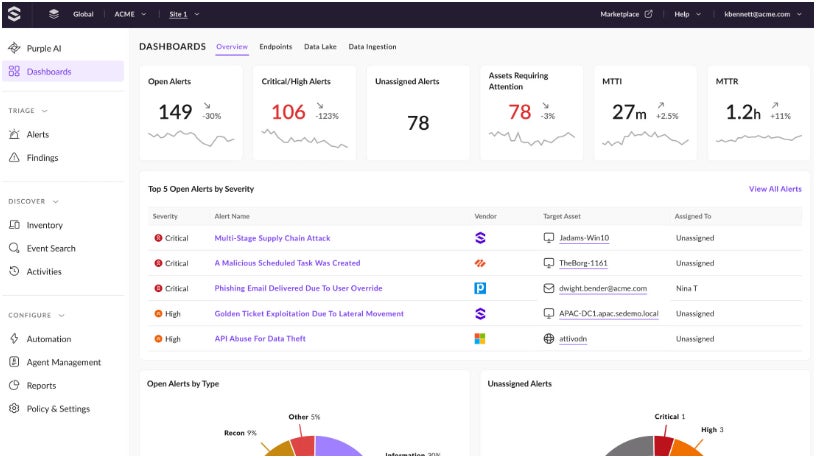
Pros and cons
| Pros | Cons |
|---|---|
|
Best for Windows environments: Microsoft Defender for Endpoint
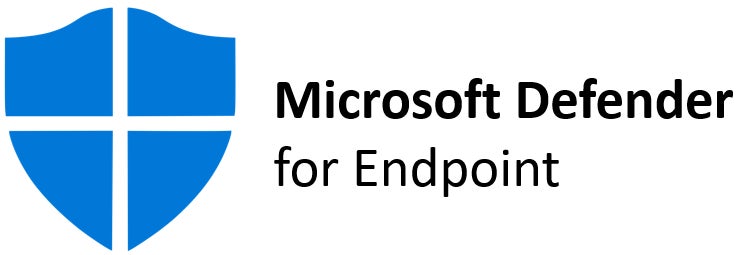
Microsoft Defender for Endpoint, or MDE, is my pick for enterprises that primarily use Windows machines and Microsoft services. MDE utilizes AI-powered systems to protect against ransomware, cyberthreats, and other adversaries. It offers a unified endpoint management console for simplified handling of machines and a worldwide threat intelligence database that keeps track of day-to-day threats.
I personally like its emphasis on providing flexible enterprise controls to easily manage access in complex org structures. This is crucial for fostering efficient workflows within an organization without compromising on security.
Why I chose Microsoft Defender for Endpoint
I picked Microsoft Defender for Endpoint for its easy integration with Windows workstations and its inclusion in the value-laden Microsoft 365 E5 enterprise plan.
For businesses already invested in the Microsoft or Windows ecosystem, MDE is a no-brainer — especially since you can have it alongside other Microsoft products like Outlook, OneDrive, Power BI Pro, and others. This is on top of having top-tier threat detection capabilities and seamless integration with other Microsoft software.
Pricing
Microsoft Defender for Endpoint has two subscription tiers: MDE P1 and P2. P1 offers Microsoft’s next-generation anti-malware and endpoint firewall tools. P2 offers all P1 features plus the main EDR security suite. For EDR users, MDE P2 is the choice to go for.
Both P1 and P2 can be purchased via one of the Microsoft 365 bundles, as outlined below:
- Microsoft 365 E3: $33.75 per user, per month; includes MDE P1 anti-malware solution, with 365 apps, Windows for Enterprise, and 1TB of cloud storage.
- Microsoft 365 E5: $54.75 per user, per month; includes all Microsoft 365 E3 features plus MDE P2 EDR solution with advanced security and compliance features and Power BI business analytics.
Features
- Global threat intelligence.
- Auto-delayed deception techniques.
- Automatic cyberattack disruption.
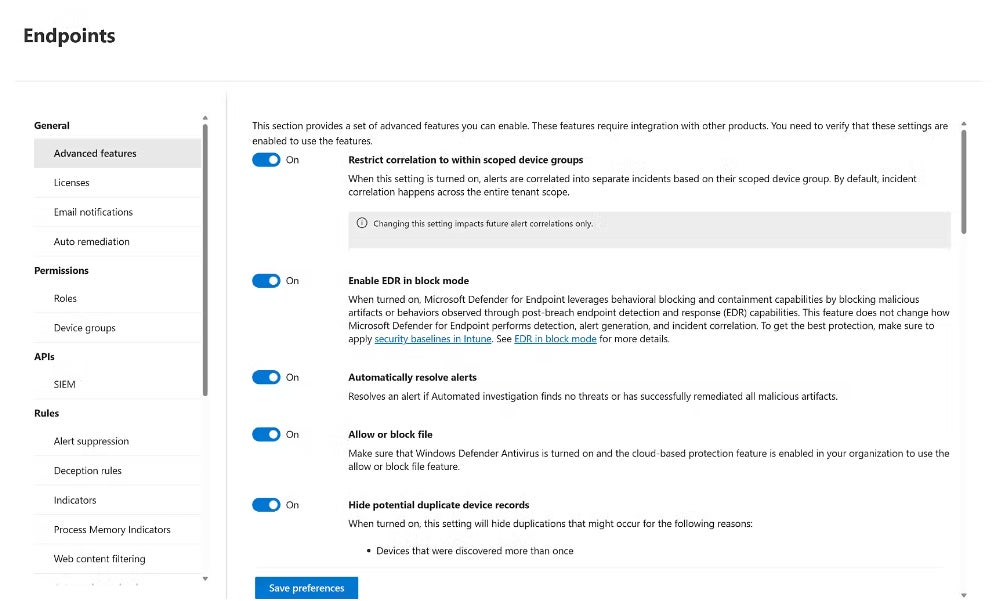
Pros and cons
| Pros | Cons |
|---|---|
|
|
CrowdStrike Falcon Insight XDR: Best for top-tier security

If security is your top priority, I recommend CrowdStrike Falcon. CrowdStrike’s XDR is widely recognized as one of the best services in the EDR space. It offers AI-powered threat detection, a lightweight and intuitive agent, and enterprise-scale automation capabilities. In Forrester’s Endpoint Security report for Q4 2023, CrowdStrike was recognized as a Leader in endpoint security, with its powerful prevention engines and low impact on endpoint performance as highlight mentions.
Unfortunately, CrowdStrike as a company was recently involved in a large-scale IT outage, where a content update for one of its services disrupted over 8.5 million Windows machines worldwide.
For this reason, I can understand if some enterprises are wary of picking CrowdStrike, given the scale of the outage. To learn more, read our full coverage on the CrowdStrike outage here.
Why I chose CrowdStrike Falcon
Even with the recent outage, I still feel CrowdStrike Falcon brings a ton of value with its top-tier threat detection and remediation capabilities.
As I browsed user testimonials, CrowdStrike is a consistent pick for many users looking for a quality EDR. According to a Reddit user in the cybersecurity community, “CrowdStrike is consistently the best at detection and blocking. Surprisingly few false positives, also straightforward to tune.”
Of course, it’s completely justified to forego CrowdStrike given the outage — especially if your business was specifically affected due to the mass disruption. If you’re on the fence about CrowdStrike and want to look at other solutions, check out our CrowdStrike alternatives article here.
Pricing
CrowdStrike has three enterprise options, namely Falcon Pro, Falcon Enterprise, and Falcon Elite. Of the three, Falcon Enterprise and Elite include CrowdStrike’s EDR and XDR solutions. Below is a summary of pricing for each and their respective feature inclusions:
- Falcon Pro: $99.99 per device, per year; next-gen antivirus, device control, integrated threat intelligence.
- Falcon Enterprise: $184.99 per device, per year; all Falcon Pro features plus EDR and threat hunting.
- Falcon Elite: Contact sales for pricing; endpoint and identity protection, Falcon Insight XDR, threat hunting.
Features
- AI-powered risk scoring for threat prioritization.
- Falcon Fusion security orchestration automation and response.
- Threat intelligence on 230+ adversaries.
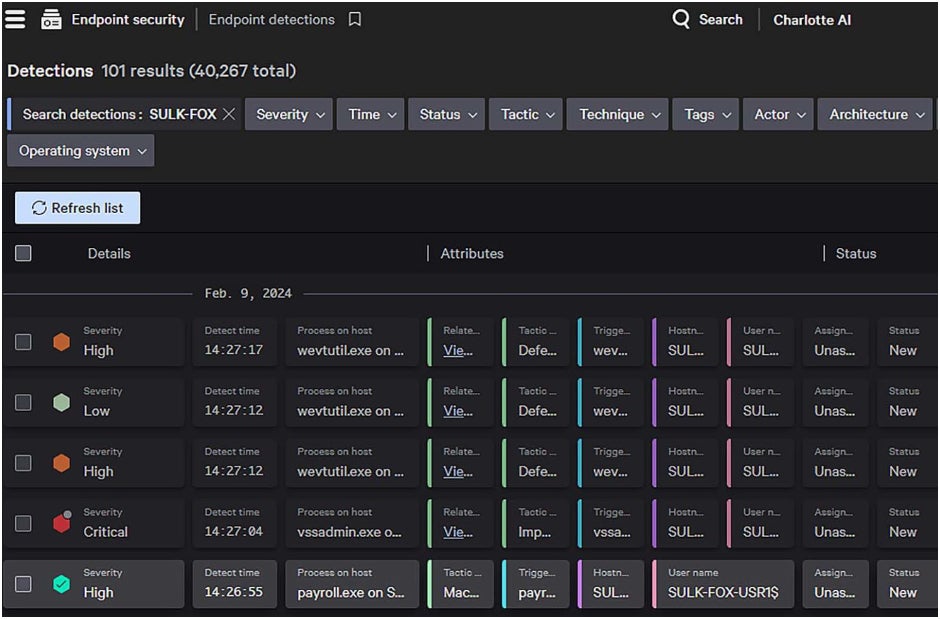
Pros and cons
| Pros | Cons |
|---|---|
|
|
ESET: Best for home office and business antivirus
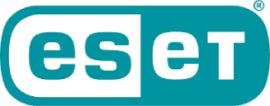
While enterprises usually refer to larger organizations, they can also cover smaller businesses or any business in general. If you’re looking for a home office or business antivirus solution, I suggest ESET. Their platform brings multilayered anti-malware protection, server security, and anti-theft capabilities.
Per AV-TEST’s June 2024 testing of ESET, its ESET PROTECT Advanced business antivirus successfully protected against 100% of all malware and web threats thrown against it.
I personally appreciate its wide range of antivirus and EDR products, covering individual consumers, small and home offices, small-to-mid-sized businesses, and enterprises.
Why I chose ESET
I selected ESET for its extensive suite of antivirus products that can accommodate individual users, small offices, and all the way to large enterprises. If you’re a business owner that wants a single provider for both your home office and your business, I think ESET presents good value propositions for both.
Pricing
For users looking to cover both their business and personal devices, I suggest looking into ESET’s Small Business Security subscription. This plan is designed for a non-IT specialist that wants a set-and-protect solution for 5–25 endpoints. Below is an overview of pricing for Small Business Security:
- Small Business Security 5 devices, 1 year: $179.99
- Small Business Security 10 devices, 1 year: $204.99
- Small Business Security 20 devices, 1 year: $410.00
Features
- Cyberattack and server protection.
- Secure banking and browsing functionality.
- Unlimited VPN built-in.
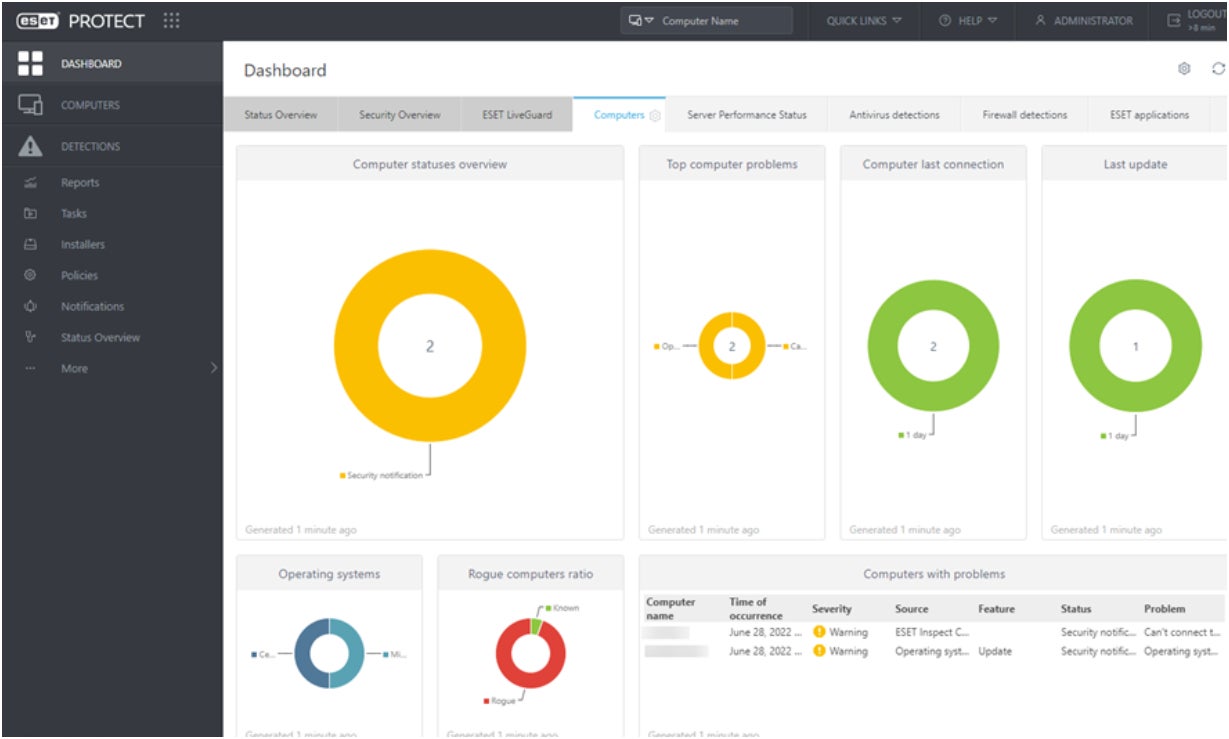
Pros and cons
| Pros | Cons |
|---|---|
|
|
Kaspersky: Best for non-U.S. users

If you’re a non-U.S. user who needs a quality antivirus, Kaspersky should be on your radar. As a home antivirus, Kaspersky performs well in protecting against zero-day malware attacks and web-based threats. In my opinion, it’s also a noteworthy choice, given it provides a generous 30-day free trial of its paid antivirus solution. To me, this can be useful to less tech-savvy business or enterprise owners who are interested in trying antivirus software with no strings attached.
Per AV-TEST’s May to June 2024 testing of Kaspersky Plus, it was able to detect and ward off 100% of malware while leaving minimal to little impact on system resources.
However, there is a significant disclaimer — I can only recommend Kaspersky for non-U.S. users and business owners due to its prohibition starting September 29, 2024. This is due to the U.S. Bureau of Industry and Security deeming Kaspersky’s products as national security risks due to the company’s Russian ties.
You can read the full BIS statement on Kaspersky here.
Why I chose Kaspersky
I picked Kaspersky for its generous 30-day free trial of its home antivirus solution and overall affordable pricing across its paid plans. While not strictly an enterprise antivirus, I find Kaspersky’s home antivirus to be a good starting point for business owners interested in looking into how such software can benefit them and their businesses.
Unfortunately, the U.S. ban on Kaspersky limits this recommendation to our non-U.S. readers. With the ban, Kaspersky may not be a realistic long-term solution, as other countries may follow suit. However, I still believe Kaspersky is a good entry point for non-U.S. users considering an antivirus solution.
Pricing
Since Kaspersky is set to cease sales in the U.S., the pricing below is according to Kaspersky’s official website in the United Kingdom.
- Kaspersky Standard 1 device: £14.99; real-time antivirus, two-way firewall, and online payment protection.
- Kaspersky Plus 1 device: £18.99; all Standard features plus data leak checker and unlimited VPN.
- Kaspersky Premium 1 device: £19.99; all Plus features plus identity protection and expert virus check and removal.
Features
- Safe web browsing capabilities.
- Anti-malware and anti-ransomware protection.
- Two-way firewall.
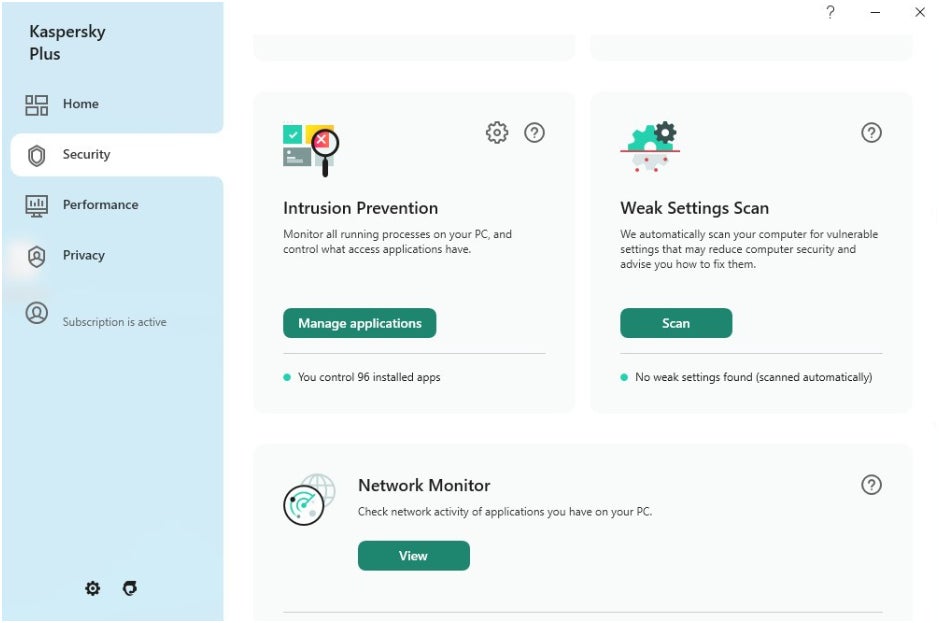
Pros and cons
| Pros | Cons |
|---|---|
|
|
Bitdefender GravityZone: Best for entry-level endpoint protection
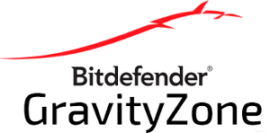
For baseline endpoint protection, I suggest looking into Bitdefender GravityZone. Bitdefender’s GravityZone platform brings AI-powered security designed to quickly identify anomalies and block threats with minimal false positives. It features automated patch management to swiftly update vulnerabilities and cross-endpoint correlation that contextualizes attacks across various endpoints.
In Gartner’s Magic Quadrant for EPP 2023 report, Bitdefender was praised for its ease of use and “flexibility to deploy in the cloud or network-constrained environments.” To me, these attributes are perfect for enterprises that are only starting to consider an EDR solution as an elevated “enterprise antivirus” security tool.
Why I chose Bitdefender GravityZone
I have Bitdefender GravityZone on this list for being a solid entry-level pick for enterprises that are considering a transition into the EDR space. I also appreciate Bitdefender’s wide OS support — which covers both modern and legacy operating systems — positioning it as a viable option for enterprises that may have older hardware.
Pricing
Bitdefender’s GravityZone offerings, catered to medium-to-large businesses, all require interested users to contact their sales team for a price quote. Below is an overview of its four enterprise-level products and their corresponding features:
- GravityZone Business Security Premium: Contact for pricing; automated threat prevention, remediation, attack forensics, and cloud sandboxing.
- GravityZone Business Security Enterprise: Contact for pricing; EDR with cross-endpoint correlation and integrated EPP capabilities.
- GravityZone XDR: Contact for pricing; XDR with organization-wide data correlation and human-readable insights for security incidents.
- MDR PLUS: Contact for pricing; MDR plus dark web detection and response.
I appreciate how the three GravityZone products above all have accessible free trials. Meanwhile, Bitdefender’s MDR PLUS has an interactive demo via its official website.
Features
- Automated cross-endpoint correlation.
- Fileless attack defense.
- Risk Management capabilities.
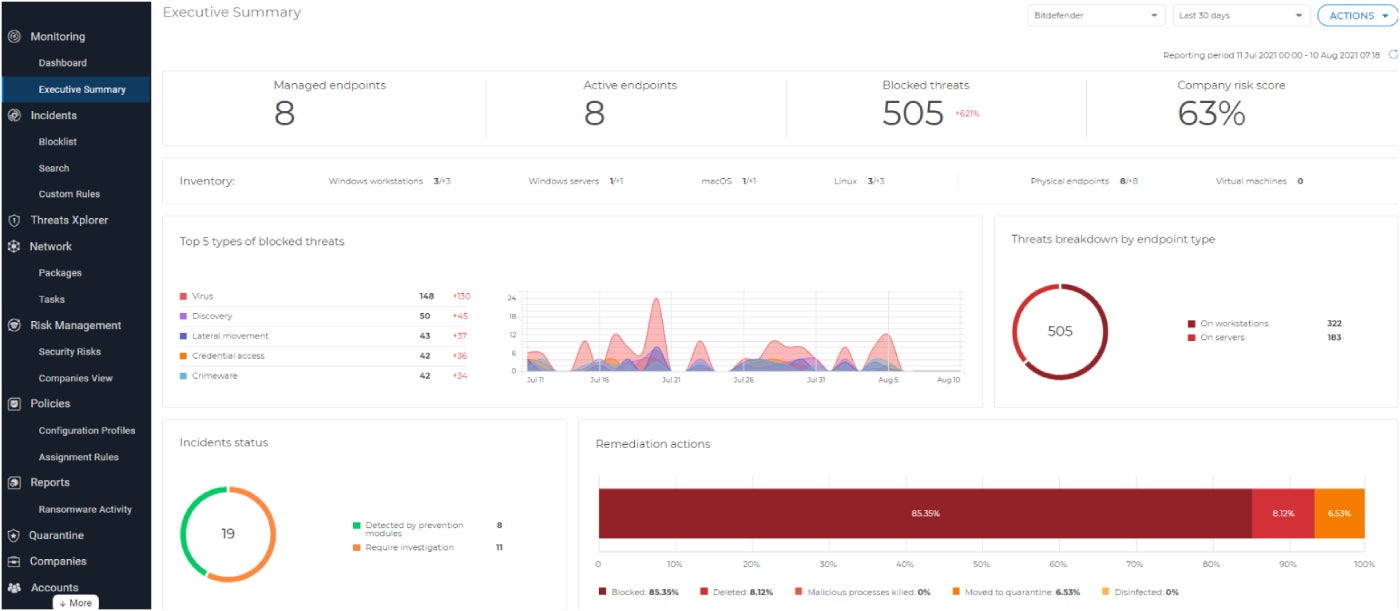
Pros and cons
| Pros | Cons |
|---|---|
|
|
How do I choose the best enterprise antivirus for my business?
When choosing the best enterprise antivirus, I highly encourage you to consider these factors:
Shift from enterprise antivirus to EDR
While traditional antivirus solutions are good at detecting known malware, they’re not equipped to secure enterprises with numerous endpoints and devices. On the flipside, EDR solutions are built precisely for large businesses and can analyze, not only known malware, but also zero-day threats via machine learning and behavioral analysis.
With this, our list above recommends more EDR solutions compared to strictly antivirus software, as they are better built to handle the security requirements of an enterprise environment.
Look for independent test results
Fortunately, there are numerous independent testing firms that specifically focus on testing the effectiveness and quality of antivirus software. When you have an AV in mind, I highly encourage you to see whether this solution has any recent results from sites like AV-TEST or AV-Comparatives.
These AV testing organizations provide objective test results that cover how well an AV solution detects and protects against malware, as well as how much impact they have on a computer system’s resources.
Contact providers and maximize demos
Finally, most enterprise antivirus and EDR solutions offer a free-of-charge product demo or a way to request one on their official website. I strongly suggest maximizing these free demos to get a glimpse of how an AV or EDR solution works and if they’re able to meet your enterprise needs.
Methodology
My rundown of the best enterprise antivirus solutions involved an in-depth assessment of each solution’s standout security features, pricing, and overall value.
Research for this article was done through an in-depth analysis of official product documentation, independent test results, and real user feedback.
Finally, I also considered what type of business or enterprise would benefit most from each solution listed above. My aim here is to help businesses align with the enterprise antivirus and EDR provider that best meets their security needs.

